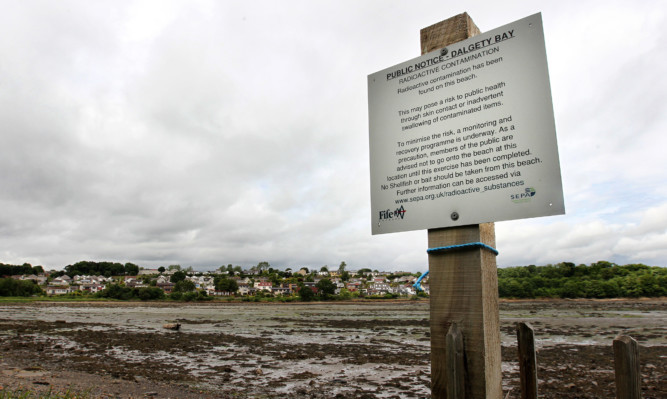Radiation has been found for the first time in mussel beds off Dalgety Bay.
Routine monitoring carried out by the Scottish Environment Protection Agency and Food Standards Scotland (FSS) at the weekend made the find.
In addition, more contaminatedparticles were again found on the beach, which has been blighted by radiation for more than 25 years.
The radiation comes from Second World War aircraft broken up and dumped on the area.
Dr Paul Dale, Sepa’s principal policy officer with the radioactive substances team, said the latest find showed the importance of the public adhering to safety warnings, staying off thedemarcated area of beach and notpicking up any items from the beach.
“We do not believe that at this stage any further actions are required,” he said.
A ban is already in place that forbids people from removing any seafood from the Dalgety Bay area. Because of this Food and Environment Protection Act (Fepa) order, put in place in May 2012, the FSS did not consider this new find presented a food safety risk, according to its scientific adviser, Dr Will Munro.
This ban will stay in place untilremediation measures are completedby the Ministry of Defence and itscontractors, he added.
Dr Munro said mussel beds were included in the monitoring programme because mussels are most likely to ingest particles due to the way they feed.
“Although the particles originate from specific parts of Dalgety Bay, the Fepa area covers the whole of the bay, in order to prevent fishing from areas to which the particles may have beentransported,” he added.
The Ministry of Defence, which is working on a plan for the area, carries out routine monitoring, but Dr Daletold south west Fife area committee: “As a regulator, we undertook beachmonitoring at the weekend.”
A couple of particles were found and removed from the beach. The agency also carried out monitoring of the offshore mussel beds, at the request of FSS.
“Our message remains the same:precautionary measures put in place are effective and providing people follow these there is no increase in risk from the beach,” Dr Dale added.
